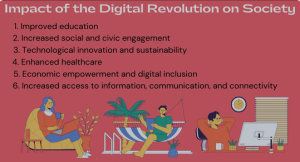The current digital revolution has had a profound impact on the corporate world, influencing various aspects of business operations, strategies, and overall dynamics. Here are some key ways how the current digital revolution has affected the corporate world:

How the Current Digital Revolution has Affected the Corporate World
-
Table of Contents
ToggleDigital Transformation:
- Corporations are undergoing comprehensive digital transformations, leveraging technologies like cloud computing, big data analytics, artificial intelligence (AI), and the Internet of Things (IoT) to streamline processes, enhance efficiency, and remain competitive in the rapidly evolving business landscape.
-
Increased Connectivity and Collaboration:
- Digital technologies have facilitated seamless communication and collaboration within and between organizations. Tools such as video conferencing, instant messaging, and collaborative platforms have transformed how teams work together, even across geographically dispersed locations.
-
Data-driven Decision Making:
- The digital revolution has ushered in an era of data abundance. Corporations are now harnessing big data analytics to derive actionable insights, enabling informed decision-making. Data-driven strategies help companies better understand customer behavior, market trends, and operational efficiency.
-
Customer Experience and Engagement:
- The digital era has reshaped customer expectations. Companies are leveraging technology to enhance the customer experience through personalized interactions, online services, and digital marketing strategies. Social media platforms also play a crucial role in brand engagement and customer feedback.
-
E-commerce and Online Presence:
- The rise of e-commerce has transformed the way businesses sell products and services. Many traditional brick-and-mortar companies have expanded their online presence, adopting digital storefronts to reach a wider audience and provide convenient shopping experiences.
-
Agile Business Models:
- Digital technologies enable agile and flexible business models. Companies can quickly adapt to changing market conditions, respond to customer feedback, and innovate more rapidly. This agility is crucial for staying competitive in dynamic industries.
-
Automation and AI-driven Processes:
- Automation, powered by AI and machine learning, has streamlined routine and repetitive tasks, increasing operational efficiency. This not only reduces costs but also allows employees to focus on more complex and creative aspects of their roles.
-
Cybersecurity Challenges:
- As corporations embrace digital technologies, they face increased cybersecurity threats. The need for robust cybersecurity measures has become paramount to protect sensitive data, maintain business continuity, and safeguard the trust of customers and stakeholders.
-
Globalization and Remote Work:
- Digital tools have facilitated globalization by enabling companies to connect with partners, customers, and employees worldwide. The advent of remote work, accelerated by digital technologies, has transformed traditional office setups and introduced new challenges and opportunities for corporations.
-
Sustainability and Green Technologies:
- The digital revolution has also influenced corporate responsibility and sustainability efforts. Companies are using technology to optimize energy usage, reduce environmental impact, and implement sustainable practices throughout their supply chains.
Overall, the current digital revolution has reshaped the corporate landscape, prompting organizations to adapt, innovate, and embrace technology to stay competitive in an ever-changing business environment.
